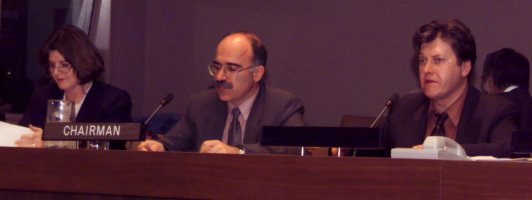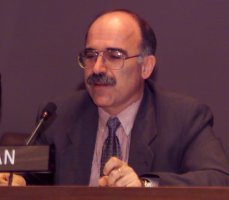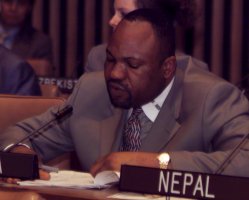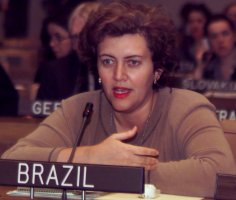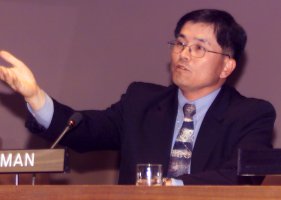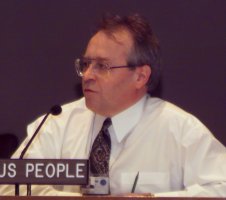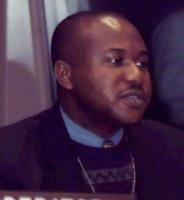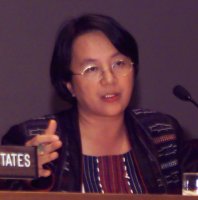| |
| Drafting Group on Preparations for Rio+10, the
outcome of the Intergovernmental Forum on Forests and other matters |
|
JoAnne
DiSano, Director, Division for Sustainable Development, Chair
Zvetolyub Basmajiev, Bulgaria,
and Andrey Vasilyev, Secretariat
|
|
Drafting
Group 3 Chair Zvetolyub Basmajiev (Bulgaria)
|
|
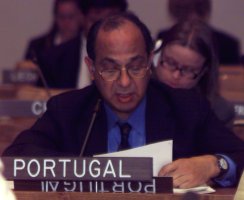 |
 Julio Mascarenhas,
(Portugal), on behalf of the European Union (EU)
reaffirmed its views on the preparations for Rio+10 : the summit
must be a high-level political meeting with participation of Heads
of State, it should take place in a developing country, with
representatives from civil society including major NGOs, the
scientific community, business/industry, and youth. The meeting
should not re-negotiate Agenda 21 and the Rio Declaration, but
should be an assessment of implementation, and future challenges. The
summit should allow governments to renew their support and result
in an
action-oriented political commitment. Suggestions for topics
included sustainable consumption patterns, environment and
security, the need to reverse decline in natural resources, and
strengthening of institutional
frameworks for participation at all levels. The EU also supported
the establishment of a trust fund to ensure the full participation
of developing countries.
Julio Mascarenhas,
(Portugal), on behalf of the European Union (EU)
reaffirmed its views on the preparations for Rio+10 : the summit
must be a high-level political meeting with participation of Heads
of State, it should take place in a developing country, with
representatives from civil society including major NGOs, the
scientific community, business/industry, and youth. The meeting
should not re-negotiate Agenda 21 and the Rio Declaration, but
should be an assessment of implementation, and future challenges. The
summit should allow governments to renew their support and result
in an
action-oriented political commitment. Suggestions for topics
included sustainable consumption patterns, environment and
security, the need to reverse decline in natural resources, and
strengthening of institutional
frameworks for participation at all levels. The EU also supported
the establishment of a trust fund to ensure the full participation
of developing countries. |
|
 Ositadinma
Anaedu, (Nigeria), on behalf of
G-77/China recommended that governments should undertake
national reviews immediately, and that the Secretary General's
report for 2002 should include views expressed at last week's High
Level Segment. Rio+10 should be held at summit level in a developing
country and that CSD-10 should be an open-ended committee to review
Agenda 21 at regional and international levels, and should develop a
trust fund to provide for the participation of all developing
countries in the preparatory process, and facilitate the 10 year
review.
Ositadinma
Anaedu, (Nigeria), on behalf of
G-77/China recommended that governments should undertake
national reviews immediately, and that the Secretary General's
report for 2002 should include views expressed at last week's High
Level Segment. Rio+10 should be held at summit level in a developing
country and that CSD-10 should be an open-ended committee to review
Agenda 21 at regional and international levels, and should develop a
trust fund to provide for the participation of all developing
countries in the preparatory process, and facilitate the 10 year
review.
|
|
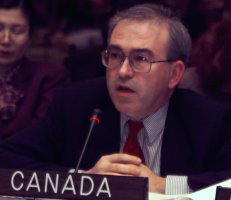 |
Regarding the IFF outcomes, Dick Balhorn, (Canada) noted that
there is no mention of how the UN Forum on Forests (UNFF) is to
be linked to the UN system. Brazil suggested informal consultations
to discuss the UNFF location.
|
 Barbara Briglia
Tavora, (Brazil) concurred
that the preparatory process to Rio+10 must be transparent, and
must include provisions to allow all UN members to participate.
Discussions about topics should take place during the GA, and
planning should begin as soon as possible. Questions about
finances were raised about the budgetary structure planned for
Rio+10 to provide some idea as to parameters for planning Rio+10.
Furthermore, Brazil inquired as to the possibility of holding
CSD-10 in 2001. The President was then requested to provide this
information by directing inquiry to the Secretariat on behalf of
members.
Barbara Briglia
Tavora, (Brazil) concurred
that the preparatory process to Rio+10 must be transparent, and
must include provisions to allow all UN members to participate.
Discussions about topics should take place during the GA, and
planning should begin as soon as possible. Questions about
finances were raised about the budgetary structure planned for
Rio+10 to provide some idea as to parameters for planning Rio+10.
Furthermore, Brazil inquired as to the possibility of holding
CSD-10 in 2001. The President was then requested to provide this
information by directing inquiry to the Secretariat on behalf of
members. |
|
| Drafting Group on Financial Resources and Mechanisms
and on Economic Growth, Trade and Investment |
|
CSD Vice-Chair and Chair of the finance and trade drafting group,
Choi Seok-young (Republic of Korea)
Drafting
Group II, chaired by Choi Seok-young (Republic of Korea), considered
the Report of the Ad Hoc Inter-sessional Working Group on Financial
Resources and Mechanisms and on Economic Growth, Trade and Investment
(E/CN.17/2000/10).
|
|
|
Day of Indigenous People
This
panel addressed the following questions: How does governance relate
to successful participatory models? How does participation affect
land rights? How does participation work at the international level
and how does it affect the intergovernmental processes? How does
can the work of the CSD benefit from these consultative mechanisms?
The experiences shared by panel members crossed all sectors, and
provided case-studies as to successes and lessons learned.
|
|
Terry
Fenge (Canada),
Director of Research, Inuit Circumpolar Conference
outlined the structure, functioning, and potential of this
international forum. The
Inuit Circumpolar Conference and its Arctic Council is a high-level
international forum which guarantees participation and access of
indigenous populations alongside international organizations, civil
society, and the UN. While the council focusses
primarily on Arctic environmental issues, it seeks to broaden and
deepen its responsibilities to include socio-economic mandates as
they pertain to hunting, fishing, trapping, and herding economies of
northern indigenous peoples, capacity building, technology transfer,
and tele-medicine. Its aboriginal SD agenda includes resource
management, economic generation, wildlife harvesting, and land
rights. Emphasis
is placed on the importance of indigenous peoples
and their specialized knowledge
with four groups maintaining Permanent Participation status.
|
|
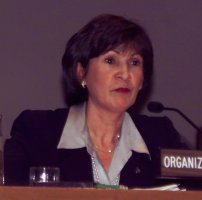 |
Zoila
Giron,
(USA) ISP
Project Manager, Unit for Sustainable Development and Environment,
Organization of American States (OAS). |
|
Carol
Kalafatic,
International Indian Treaty Council, moderated the presentations
and summarized points made during the discussion :
-
Over 80% of the earth's
biodiversity is located in the habitats of indigenous peoples.
-
Self-sufficiency is a
primary goal
-
Networking and
collaboration among indigenous peoples are needed.
Full-involvement of target
communities in international fora will facilitate empowerment. -
Self-determination
and push for rights should not be perceived as a threat to
national sovereignty or indicative of a secession movements -
self-determination and participation is a right of all peoples.
|
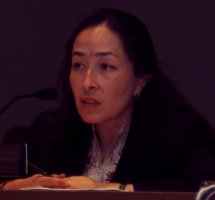 |
|
|
Kent
Clement Nnadozie,
(Nigeria) Bioresources Development and Conservation Programme,
reported on the dynamics where there is a range of ethnicity
within local indigenous populations, competing with public-sector
and private-industrial interests in resource extraction on
territorial lands. Nnadozie supported the use of
participatory rural assessments (PRA) to facilitate actively
learning, investment of communities, encouraging the sense of
local ownership, and engaging personal investment of all parties
to ensure success.
|
|
Vicky
Tauli-Corpuz (Philippines), TEBTEBBA (Foundation Asian Indigenous Women's
Network) described the process in the
establishment of the UN Working Group on Indigenous Populations to
develop minimum standards for the protection of indigenous peoples'
rights. With the success of UNCED, many opportunities presented
themselves within the UN system for cross-sectoral indigenous
participation, albeit at a relatively low level of the UN
hierarchy. The Working Group continues to stress the importance of
indigenous peoples' rights, and the need for the Working Group
to find a permanent home within the UN since its products have
been readily incorporated by some national governments as a
framework charter of indigenous rights.
|
|

 ENB
Summary of Ad Hoc Open-Ended Intergovernmental Group of Experts on Energy
and Sustainable Development ENB
Summary of Ad Hoc Open-Ended Intergovernmental Group of Experts on Energy
and Sustainable Development
 CSD-8
Intersessionals CSD-8
Intersessionals
 Linkages
CSD page Linkages
CSD page
 UN
- CSD website with official
documents UN
- CSD website with official
documents
 ENB's
"Introduction to CSD" ENB's
"Introduction to CSD"

|



